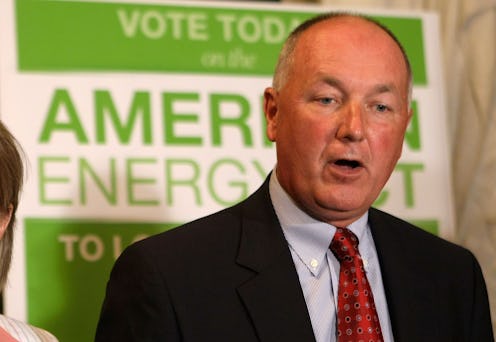News
Watch The Baffling Dutch TV Interview That Led A Trump Official To Apologize Just Now

On Friday, mainstream media and social media alike took note of an interview between a freshly-minted U.S. diplomat and a Dutch reporter. If you saw the interview, you already know how awkward and bizarre it was. But if you haven't, you might be wondering who Pete Hoekstra, the ambassador to the Netherlands, is — and why he apologized Saturday after literally crying "fake news!" in an on-air interview.
The interview itself is about as clear and simple a demonstration of the politically pervasive "fake news" excuse falling apart in real time as you'll ever going to see. Hoekstra, 64, is a Dutch-American Republican congressman, who represents Michigan's 2nd congressional district. In July, President Donald Trump picked Hoesktra to become the next U.S. ambassador to the Netherlands, where he was born. Hoekstra was confirmed by the Senate in November and is expected to finally take up residence in the Netherlands in January.
The new job means that Hoekstra is now of interest to the Dutch political media. As such, some of his past remarks about Islam in the Netherlands have gotten more time in the spotlight. That includes his baseless 2015 claim that there are so-called "no-go zones" in the country where Muslims are free to set fire to politicians. Wouter Zwart with the Dutch news program Nieuwsuur confronted Hoesktra about the anti-Muslim comments this week, setting up a pretty excruciating exchange.
Hoekstra first denied having made the claims, blasting Zwart's suggestion as "fake news." Then, the Nieuwsuur program cut to a clip of the congressman saying exactly what the reporter had told him he said: that Muslims in the Netherlands were setting fire to both cars and politicians, and that there were "no-go zones" in the country. The program then cut back to Hoekstra denying he'd used the term "fake news," to Zwart's apparent surprise and mild exasperation.
Hoekstra apologized for the embarrassing segment on Saturday, albeit in guarded and not terribly contrite words. In a statement posted to Twitter, he said that he felt "regret" over the interview, and acknowledged that he'd made "certain remarks" in 2015, validating Zwart's comments.
"I made certain remarks in 2015 and regret the exchange during the Nieuwsuur interview," Hoekstra's statement said. "Please accept my apology."
"I was born in the Netherlands and love the country. It will be the greatest honor of my life to serve as the United States Ambassador to the Netherlands," Hoekstra continued.
"I look forward to the opportunity to learn, to listen, and to move on in the spirit of peace and friendship with the people and the leaders of the Netherlands."
Hoekstra's claim that there are "no-go zones" in the Netherlands is a popular one on the conservative and anti-Islam right, although some of the countries they level these allegations against wholly deny there's any truth to it. The idea is that certain portions of cities are too dangerous and uncontrolled for people to enter, and are disregarded by law enforcement.
Places like Sweden and the Netherlands have strongly denied the existence of such zones, which are routinely invoked in order to stir up sentiment against Muslim immigration, and Hoekstra's belief in their existence has been a big topic of controversy with the Dutch.
Hoekstra is not the first Republican official to deploy the "fake news" line in the face of questioning from the press, although few have faced as immediate and decisive a fact-check as he did. In October, Republican representative Paul Gosar of Arizona ducked questions on conspiracy theories he'd advanced about August's deadly white supremacist rally in Charlottesville, Virginia by calling them "fake news," then hurrying away down a stairwell.
More recently, Republican senator Bob Corker of Tennessee used the line to attack the media's coverage of the GOP tax bill. Specifically, Corker described the media's scrutiny of a particular provision of the new law ― one which will further enrich he and some of his colleagues ― as "fake news."
"I actually understand what it is the president has been dealing with," Corker said.
Hoekstra was sworn-in as the U.S. ambassador to the Netherlands by Vice President Mike Pence in a ceremony earlier this month. It remains to be seen how significantly the interview might sour his relationships with Dutch officials ― as The Washington Post noted on Saturday, many of his conservative views were already out-of-step with public opinion in the Netherlands.